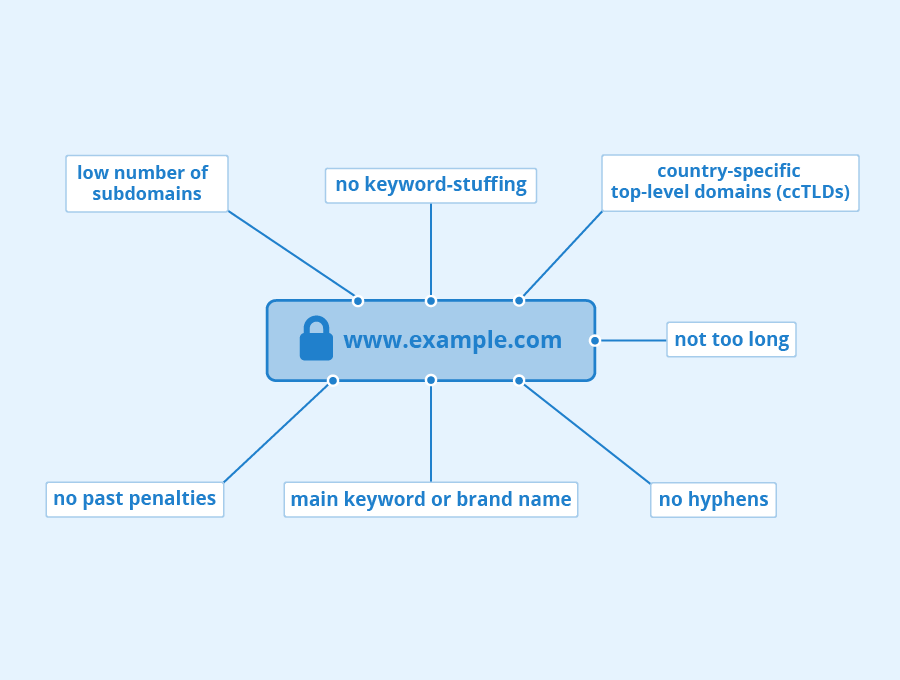Importance of domain names in SEO
In the vast landscape of the internet, domain names hold a significant role in shaping a website's visibility, credibility, and overall success. Understanding the importance of domain names in Search Engine Optimization (SEO) is essential for businesses and individuals looking to establish a strong online presence.
In this blog post, we will delve into the crucial role domain names play in SEO and how they can impact your website's rankings, user experience, and branding.
What is SEO and why it is Important
SEO stands for Search Engine Optimization. It is the practice of optimizing a website to improve its visibility and ranking in search engine results pages (SERPs). SEO encompasses various strategies and techniques aimed at increasing organic (non-paid) traffic to a website from search engines like Google, Bing, and Yahoo.
SEO is important for several reasons:
Increased Organic Traffic: When your website ranks higher in search engine results, it becomes more visible to users searching for relevant keywords or topics. By optimizing your website for SEO, you can attract a higher volume of organic traffic, resulting in more potential customers or visitors.
Improved User Experience: SEO involves enhancing various aspects of your website, such as site structure, page loading speed, and mobile-friendliness. These improvements not only help search engines understand and index your site better but also contribute to a better user experience. Websites that are easy to navigate, load quickly, and provide relevant and valuable content tend to have lower bounce rates and higher engagement metrics.
Brand Visibility and Credibility: When your website consistently appears on the first page of search results, users perceive it as more credible and trustworthy. A strong SEO presence helps build brand visibility and establishes your website as an authority in your industry. This can lead to increased brand recognition and customer trust.
Targeted Audience: SEO allows you to target specific keywords and phrases relevant to your business or industry. By optimizing your website for these keywords, you can attract users who are actively searching for products, services, or information related to what you offer. This means you are reaching a highly targeted audience, increasing the chances of converting them into customers.
Cost-Effective Marketing: Compared to other digital marketing channels, SEO can provide long-term and cost-effective results. While it may require an initial investment of time and resources, the benefits of improved organic rankings can continue to drive traffic and generate leads even after the initial optimization work is done. This makes SEO a sustainable and cost-effective marketing strategy for businesses of all sizes.
Stay Competitive: In today's digital landscape, most businesses have an online presence. By neglecting SEO, you risk falling behind your competitors who are actively optimizing their websites. Staying on top of SEO trends and best practices helps you stay competitive and relevant in the online space.

Understanding Domain Names
A domain name is a unique and memorable address that identifies a website on the internet. It serves as the online identity or the digital address of a website, allowing users to access the website by typing the domain name into their web browsers.
A domain name consists of two main parts: the top-level domain (TLD) and the second-level domain (SLD). The TLD is the extension that appears at the end of the domain name, such as .com, .org, or .net. The SLD is the main part of the domain name, which is chosen by the website owner and typically represents the name of the brand, business, or organization.
Domain names play a crucial role in establishing a brand's online presence and identity. It is often advisable to choose a domain name that aligns with the brand name or reflects the nature of the website's content. A strong and memorable domain name can help differentiate a business from its competitors and create a lasting impression on users.
Importance of a good domain name
A good domain name is important for several reasons. Firstly, it serves as your online identity and plays a crucial role in establishing and promoting your brand. A domain name that aligns with your brand or business name makes it easier for users to remember and find your website, contributing to brand recognition and recall.
A good domain name enhances your credibility and builds trust with your audience. It gives the impression that you are a legitimate and reputable business, which is essential for attracting and retaining customers. A professional and relevant domain name demonstrates your commitment to providing quality products or services.
Moreover, a good domain name contributes to a positive user experience. It should be easy to spell, pronounce, and remember, enabling users to share your website with others and return to it in the future. A complicated or confusing domain name can lead to user frustration and hinder your website's success.
A unique and distinctive domain name sets you apart from competitors. It helps differentiate your brand and makes it easier for users to find you among similar websites. A memorable domain name can also attract organic traffic and potential customers who might have heard or seen your domain name elsewhere.
The Connection Between Domain Names and SEO
The connection between domain names and SEO (Search Engine Optimization) is an important aspect to consider when building an online presence. While the direct influence of domain names on SEO has evolved over time, they still play a role in how search engines perceive and rank websites. Here are some key points regarding the connection between domain names and SEO:
Relevance: Having a domain name that reflects the nature of your business or the keywords you want to target can help search engines understand the purpose and content of your website. For example, if your business is selling organic skincare products, a domain name like "organicbeauty.com" can indicate relevance to search engines.
User Trust and Click-Through Rates: A well-chosen domain name that aligns with user search queries can enhance click-through rates from search engine results pages (SERPs). When users see a domain name that matches their search intent, they are more likely to click on your website, leading to increased organic traffic.
Branding and Memorability: A unique and memorable domain name can contribute to brand recognition and recall. When users remember your domain name, they are more likely to directly search for it or mention it to others. This can lead to increased direct traffic and brand authority, which indirectly affects SEO.
Backlinks and Anchor Text: Backlinks, which are links from other websites pointing to yours, play a significant role in SEO. Having a descriptive domain name can make it easier for others to link to your website using relevant anchor text. Anchor text is the clickable text of a link and can help search engines understand the context and topic of your website.
Brand Signals: Search engines consider various brand signals when evaluating the authority and credibility of a website. A domain name that matches your brand name or is associated with your brand can strengthen these signals and positively impact SEO.
Local SEO: For businesses targeting specific geographic locations, including location-based keywords in the domain name can be beneficial for local SEO. It helps search engines associate your website with the relevant location and increases the chances of appearing in local search results.
It's important to note that while domain names can influence SEO, they are just one of many factors. High-quality content, user experience, backlinks, and technical optimization are also critical for SEO success. Therefore, it's advisable to choose a domain name that aligns with your brand, is relevant to your target audience, and contributes to a positive user experience, while also considering other essential SEO practices.

Examples of SEO-friendly domain names
When choosing an SEO-friendly domain name, it's essential to consider relevance, keyword usage, and user-friendliness. Here are some examples of SEO-friendly domain names:
Keyword-Rich Domain
If your target keywords are specific and valuable for your business, incorporating them into your domain name can be beneficial. For example, if you offer web design services in New York, a domain like "newyorkwebdesign.com" or "nywebdesignexperts.com" can be SEO-friendly.
Brandable and Memorable
Creating a unique and memorable brand can help your domain name stand out. Consider using a catchy, easy-to-remember name that aligns with your brand identity. Examples include "moz.com" for a popular SEO software company or "buzzfeed.com" for a viral content platform.
Local Focus
If your business operates in a specific geographic area, incorporating the location into your domain name can enhance local SEO. For instance, "miamirealestatepros.com" or "chicagoplumbingexperts.com" can indicate your local presence and improve visibility for location-specific searches.
Industry-Specific
Choosing a domain name that reflects your industry or niche can help with SEO. For example, "healthytreats.com" for a health food blog or "techgadgetreviews.com" for a technology review website. It gives search engines and users a clear indication of the website's focus.
Long-Tail Keywords
Long-tail keywords are more specific and less competitive. Incorporating long-tail keywords into your domain name can help target a specific audience. For instance, "bestrunningshoesformarathons.com" or "veganrecipesforbeginners.com" can attract users searching for those specific topics.
Remember, while keyword usage in a domain name can be beneficial for SEO, it's essential to maintain a balance. The domain name should still be brandable, easy to remember, and relevant to your target audience. Additionally, focusing on high-quality content, user experience, and other SEO strategies alongside a well-chosen domain name will contribute to overall SEO success.

Tips for Choosing Domain Names for SEO
When selecting a domain name for SEO purposes, there are several tips to keep in mind. Consider the following:
Keywords: Incorporate relevant keywords into your domain name that align with your business or website's focus. This can help search engines understand the topic and improve your website's visibility for relevant searches.
Branding: Create a unique and memorable domain name that reflects your brand. It should be easy to spell, pronounce, and remember. A strong brand can increase recognition and attract more visitors.
Short and Simple: Keep your domain name concise and straightforward. Avoid using long and complex names that are difficult to type and remember. Shorter domain names are also less prone to typing errors.
Avoid Hyphens and Numbers: Hyphens and numbers can make domain names confusing and harder to remember. It's best to choose a domain name without these special characters whenever possible.
Location Targeting: If your business caters to a specific geographic area, consider including the location in your domain name. This can help with local SEO and attract users searching for businesses in that area.
Research Competitors: Check out domain names used by your competitors to gain insights and inspiration. Avoid choosing a domain name that is too similar to competitors to maintain uniqueness.
Domain Extension: Select a domain extension that suits your business and target audience. While .com is the most common and preferred extension, there are other options like .org, .net, or industry-specific extensions like .tech or .design.
Avoid Trademark Issues: Ensure that your chosen domain name doesn't infringe on any trademarks or copyrights. Conduct a search to verify that the name is available and doesn't violate any legal rights.
Future Scalability: Consider the long-term goals of your business and choose a domain name that allows for future expansion or diversification. This prevents the need for rebranding or domain changes down the line.
Mobile-Friendly: With the increasing use of mobile devices, make sure your domain name is mobile-friendly and easy to type on small screens. Avoid complex or lengthy names that could be challenging to enter on a mobile device.

Case Studies: Successful Domain Names for SEO
"Amazon.com": Amazon's domain name perfectly aligns with its brand and focus on e-commerce. The inclusion of the keyword "Amazon" in the domain name helps the website rank high in search results when users search for products or services related to online shopping.
"Moz.com": Moz is a well-known SEO software and marketing company. Their domain name "Moz.com" is short, memorable, and directly related to their brand. It effectively represents their expertise in the field of SEO and digital marketing.
"Healthline.com": Healthline is a popular health information website. Their domain name "Healthline.com" clearly communicates their focus on health-related content. It includes the keyword "health" and is straightforward, making it easy for users to understand the purpose of the website.
"Backlinko.com": Backlinko is an SEO blog run by Brian Dean, known for its high-quality content on link building and SEO strategies. The domain name "Backlinko.com" suggests its focus on backlinks and optimization techniques. It stands out and is unique, helping it gain recognition in the SEO community.
"TripAdvisor.com": TripAdvisor is a renowned travel website that provides user-generated reviews and information on hotels, restaurants, and attractions. Their domain name "TripAdvisor.com" clearly indicates their niche and helps them rank well in search results for travel-related queries.
These case studies demonstrate how well-chosen domain names can contribute to the success of websites in their respective industries. They showcase the importance of incorporating relevant keywords, brand alignment, and simplicity in domain name selection for effective SEO.
Common Mistakes to Avoid When Choosing Domain Names for SEO
When choosing a domain name for SEO, it's important to avoid certain common mistakes that can negatively impact your website's search engine rankings. Here are some mistakes to avoid:
Keyword stuffing: While incorporating relevant keywords in your domain name is beneficial, overdoing it by stuffing multiple keywords can make the domain name look spammy. Aim for a concise and natural-sounding domain name.
Choosing a long and complicated domain name: Long and complex domain names can be difficult to remember and type correctly. Keep your domain name short, simple, and easy to pronounce to enhance user experience and brand recognition.
Ignoring brandability: Your domain name is not just for search engines; it's also for your audience. Neglecting the brandability aspect by solely focusing on keywords can make your domain name forgettable. Choose a name that is catchy, unique, and reflective of your brand identity.
Using hyphens and numbers: Hyphens and numbers can create confusion and make it harder for users to remember your domain name. They can also be misunderstood when verbally communicated. Opt for a domain name without hyphens or numbers for better user experience.
Not considering future growth and expansion: If you have long-term plans to expand your business or offer additional products/services, choose a domain name that can accommodate future growth. This will prevent the need for domain changes down the line, which can impact your SEO efforts.
Ignoring the importance of a .com extension: While there are various domain extensions available, .com is the most widely recognized and trusted extension. It's generally recommended to choose a .com domain if possible, as it can enhance credibility and SEO potential.
Neglecting research and trademark checks: Before finalizing a domain name, conduct thorough research to ensure it is not trademarked or already in use by another company. Avoid legal issues and potential confusion by choosing a unique domain name.
Conclusion
In conclusion, the importance of domain names in SEO cannot be overstated. A well-chosen domain name can significantly impact your website's visibility, search engine rankings, and overall online presence. It serves as the foundation for your brand's online identity and plays a crucial role in attracting organic traffic.
By incorporating relevant keywords, keeping the domain name concise and memorable, and considering brandability, you can optimize your website's SEO potential. A strong domain name helps users find your website easily, encourages click-through rates, and establishes trust and credibility.
Additionally, avoiding common mistakes such as keyword stuffing, using hyphens or numbers excessively, and neglecting future growth can ensure a successful domain name strategy.
Remember that a domain name is not just a technical aspect of your website; it's a reflection of your brand and an opportunity to make a lasting impression on your audience. By choosing an SEO-friendly domain name, you can set the stage for higher search rankings, increased organic traffic, and ultimately, business success in the online landscape.

Nadejda Milanova
An experienced Content creator in the field of Search Engine Optimization (SEO) and WordPress. A true proffesional with a Master's degree focused on journalism.
Read more by Nadejda Milanova





